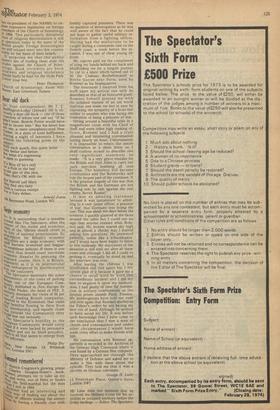it ,ummel remembered a trick Cosgrave's glowing praise k) C harles Douglas-Home's book, h one/
prompts me to take up my
to and write, not of films or books 0.11t)at the field-marshal but the man pr,rri I met in 1944. ■ Abd111/11e1 had an interesting and 3itat.,e Way of finding out about the tort;ILY of officers leading the enemy -es hY having a friendly chat with
freshly captured prisoners. There was no question of interrogation as he was well aware of the fact that he could not hope to gather useful military information from a fighting officer. Having had the misfortune to be caught during a commando raid on the French coast, a week before the invasion, I was one of these young officers.
My captors paid me the compliment of tying my hands behind my back and blindfolding me for a longish journey by car to a place which turned out to be the Chateau Rochefoucauld at Roche Guyon near Paris, used by Rommel as his headquarters.
The treatment I received from his staff upon my arrival can only be described as that of an honoured guest. Rommel himself greeted me with the polished manner of an old world diplomat and made me teel at ease by expressing the sympathy of a front-line soldier to another who was facing the frustration of being a prisoner of war.
Sitting around a beautiful table in a magnificent room with his Chief of Staff and some other high ranking officers, Rommel and I had a truly pleasant and interesting conversation lasting nearly an hour. Unfortunately it is impossible to relate the entire conversation in a short letter so I shall confine myself to describe one very significant statement he made: "It is a very grave mistake for the British and their Allies to carry out such merciless bombing all over Europe. The homeless will become communists and the Bolsheviks will rule the largest part of the continent. It is the greatest tragedy of this war that the British and the Germans are not fighting side by side against the real enemy, Soviet Russia!"
It was an amazing statement because it was tantamount to admitting to a very junior officer, a prisoner of war, that Germany was losing the war. This was about ten days before the invasion. I quickly glanced at the faces around the table but I could see no sign that anyone realised what Rommel said. My morale soared sky high and in almost a cheeky way I started asking him questions. He answered patiently, rather like a schoolmaster, and I would have been happy to listen to him endlessly. My enjoyment of the situation is still with me after all these years and although I did all I could to prolong it, eventually he stood up and the interview was over.
After leaving the chateau I was blindfolded and tied again but I felt almost glad of it because it gave me a chance to recall word by word this extraordinary incident and I did my best to engrave it upon my memory. Alas, I had plenty of time for rumination in solitary confinement at the famous prison outside Paris, Fresnes. My interrogators have told me over and over again that Rommel disobeyed the FUhrer's orders by not having me shot out of hand. Although he seemed to have saved my life, it was before such knowledge that I have come to the conclusion that I met a man of charm and consequence and under other circumstances I -would have made every effort to make friends with him.
My conversation with Rommel apparently is recorded in the Archives of the German High Command where it was found by a German film company. They approached me through the Ministry of Defence and asked me to make a film with them about the episode. They told me that it was a success on German television.
George H. Lane 12 Petersham Place, Queen's Gate, London SW7
Mr Lane does not mention that he received the Military Cross for his activities in occupied territory before the D-day landings. — Editor, The Spectator.


































 Previous page
Previous page